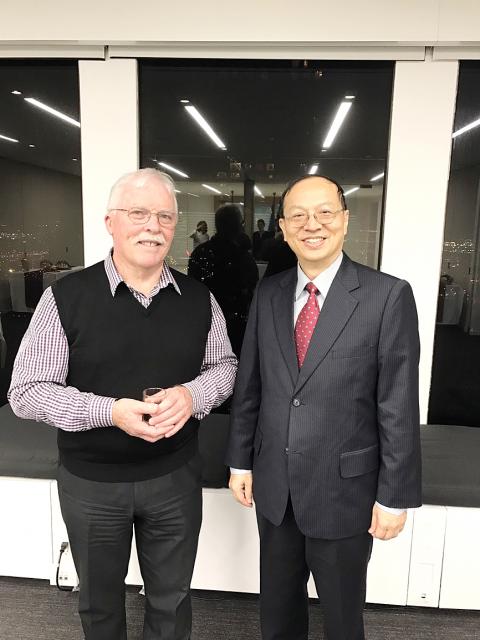A Taiwan non-governmental organization (NGO) dedicated to the treatment of rare diseases was barred from a UN-affiliated meeting in New York because of a protest from China.
Taiwan Foundation for Rare Disorders chairman Tseng Min-chieh (曾敏傑) was invited to the NGO Committee for Rare Diseases launch on Friday to talk about how Taiwan can contribute to the UN’s 2030 Agenda for Sustainable Development.
However, Swedish National Competence Centre for Rare Diseases president Robert Hejdenberg told Tseng one hour before the meeting that he would not be able to deliver his speech because of an objection from Beijing, the foundation said in a statement.

Photo provided by Taiwan Foundation for Rare Disorders
The foundation quoted a letter from the meeting’s cohost, European Organisation for Rare Diseases chief executive Yann Le Cam, saying: “We are all outraged and feel awful for today’s difficulties.”
The Ministry of Health and Welfare yesterday condemned China’s behavior as “very unreasonable.”
Taiwan will try to attend as many international organizations or conferences as possible, especially on issues such as healthcare and human rights, Health Promotion Administration Director Wang Ying-wei (王英偉) said on behalf of the ministry.
Taiwan has put much effort into taking care of minority groups throughout the years and places a high value on human rights, he said, adding that the speech had nothing to do with politics, but was about universal human rights.
“We cannot even make a speech, which highlights Beijing’s very unreasonable attitude,” Wang said. “However, we still reached out and at least it showed the world our healthcare achievements, and how unreasonably we are treated.”
During the meeting, Conference of Non-Governmental Organizations in Consultative Relationship with the UN (CONGO) president Cyril Ritchie said: “CONGO regrets that one of the speakers of today’s program was not able to enter UN headquarters. I refer to professor Tseng Min-chieh, founder of the Foundation and dean of Social sciences at National Taipei University.”
“CONGO by definition is a proponent of freedom of information, freedom of expression and the open exchange of scientific and professional knowledge. The prevention of professor Tseng from Taiwan from attending today’s CONGO meeting runs directly counter to these fundamental principles; principles that are clearly within the values proclaimed in the UN Charter,” he said.
The Ministry of Foreign Affairs said it is sorry that Taiwan could not attend a meeting where the goal is to enhance relationships among medical non-governmental organizations and the UN.
The Taipei Economic and Cultural Office in New York contacted Tseng immediately after the incident to learn more about the incident and provide assistance, it said.
Additional reporting by Peng Wen-hsin

AIR SUPPORT: The Ministry of National Defense thanked the US for the delivery, adding that it was an indicator of the White House’s commitment to the Taiwan Relations Act Deputy Minister of National Defense Po Horng-huei (柏鴻輝) and Representative to the US Alexander Yui on Friday attended a delivery ceremony for the first of Taiwan’s long-awaited 66 F-16C/D Block 70 jets at a Lockheed Martin Corp factory in Greenville, South Carolina. “We are so proud to be the global home of the F-16 and to support Taiwan’s air defense capabilities,” US Representative William Timmons wrote on X, alongside a photograph of Taiwanese and US officials at the event. The F-16C/D Block 70 jets Taiwan ordered have the same capabilities as aircraft that had been upgraded to F-16Vs. The batch of Lockheed Martin

US President Donald Trump yesterday announced sweeping "reciprocal tariffs" on US trading partners, including a 32 percent tax on goods from Taiwan that is set to take effect on Wednesday. At a Rose Garden event, Trump declared a 10 percent baseline tax on imports from all countries, with the White House saying it would take effect on Saturday. Countries with larger trade surpluses with the US would face higher duties beginning on Wednesday, including Taiwan (32 percent), China (34 percent), Japan (24 percent), South Korea (25 percent), Vietnam (46 percent) and Thailand (36 percent). Canada and Mexico, the two largest US trading

GRIDLOCK: The National Fire Agency’s Special Search and Rescue team is on standby to travel to the countries to help out with the rescue effort A powerful earthquake rocked Myanmar and neighboring Thailand yesterday, killing at least three people in Bangkok and burying dozens when a high-rise building under construction collapsed. Footage shared on social media from Myanmar’s second-largest city showed widespread destruction, raising fears that many were trapped under the rubble or killed. The magnitude 7.7 earthquake, with an epicenter near Mandalay in Myanmar, struck at midday and was followed by a strong magnitude 6.4 aftershock. The extent of death, injury and destruction — especially in Myanmar, which is embroiled in a civil war and where information is tightly controlled at the best of times —

China's military today said it began joint army, navy and rocket force exercises around Taiwan to "serve as a stern warning and powerful deterrent against Taiwanese independence," calling President William Lai (賴清德) a "parasite." The exercises come after Lai called Beijing a "foreign hostile force" last month. More than 10 Chinese military ships approached close to Taiwan's 24 nautical mile (44.4km) contiguous zone this morning and Taiwan sent its own warships to respond, two senior Taiwanese officials said. Taiwan has not yet detected any live fire by the Chinese military so far, one of the officials said. The drills took place after US Secretary